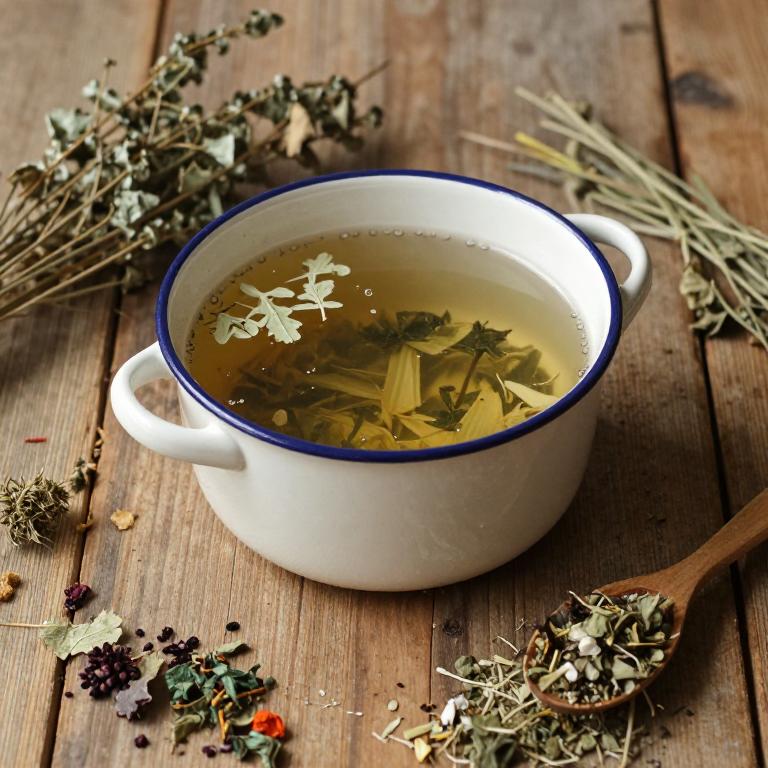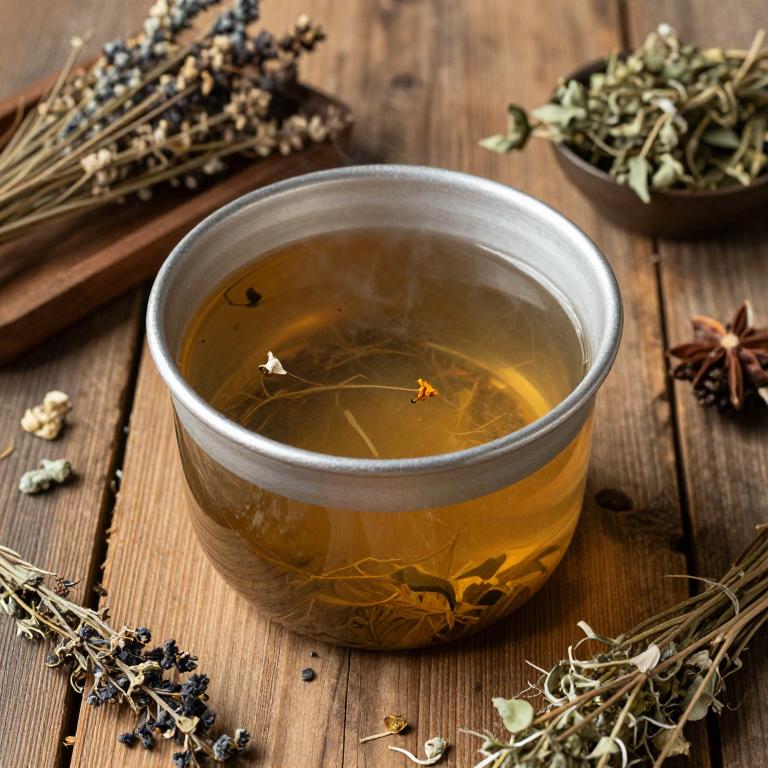10 Best Herbal Decoctions For Frizzy Hair

Herbal decoctions for frizzy hair are traditional remedies that utilize the natural properties of various plants to help manage and reduce frizz.
These decoctions typically involve boiling herbs such as nettle, horsetail, and chamomile to create a nutrient-rich solution that can be applied to the hair. The minerals and antioxidants in these herbs help strengthen hair strands and improve overall hair texture. Regular use of herbal decoctions can help tame unruly hair by adding moisture and reducing static.
While they are generally safe, it is advisable to perform a patch test to avoid any allergic reactions.
Table of Contents
- 1. Field horsetail (Equisetum arvense)
- 2. Aloe vera (Aloe barbadensis)
- 3. English lavender (Lavandula angustifolia)
- 4. Stinging nettle (Urtica dioica)
- 5. Rosemary (Rosmarinus officinalis)
- 6. Ginger (Zingiber officinale)
- 7. Bacopa (Bacopa monnieri)
- 8. Lemon grass (Cymbopogon citratus)
- 9. Peppermint (Mentha piperita)
- 10. St. john's wort (Hypericum perforatum)
1. Field horsetail (Equisetum arvense)

Equisetum arvense, commonly known as field horsetail, has been traditionally used in herbal medicine for its high silica content, which is believed to strengthen hair and reduce frizz.
Herbal decoctions of equisetum arvense are prepared by simmering the dried plant in water for several hours, allowing the beneficial compounds to be extracted. These decoctions are often used as a rinse or applied topically to the scalp and hair to improve hair texture and manageability. The silica in horsetail is thought to support the hair shaft structure, making it smoother and less prone to fraying.
While some studies suggest potential benefits, it is important to consult a healthcare professional before using equisetum arvense, as it may interact with certain medications or have side effects.
2. Aloe vera (Aloe barbadensis)

Aloe barbadensis, commonly known as aloe vera, is often used in herbal decoctions to help manage frizzy hair due to its moisturizing and soothing properties.
When prepared as a decoction, aloe vera can help strengthen hair follicles and reduce frizz by improving the overall health of the scalp and hair shaft. The gel from the aloe plant contains essential nutrients like vitamins, minerals, and amino acids that nourish the hair and promote smoothness. To make the decoction, the inner gel is typically simmered with water and other complementary herbs, creating a nutrient-rich solution that can be applied to the hair and scalp.
Regular use of aloe barbadensis decoctions may lead to reduced frizz, increased shine, and improved manageability of hair over time.
3. English lavender (Lavandula angustifolia)

Lavandula angustifolia, commonly known as English lavender, has been traditionally used in herbal medicine for its calming and therapeutic properties.
When prepared as a herbal decoction, lavender can be used to address frizzy hair by nourishing the scalp and improving hair texture. The essential oils in lavender, such as linalool and lavandulyl acetate, have antimicrobial and anti-inflammatory effects that help reduce scalp irritation and dandruff, which can contribute to frizz. To use lavender decoction for frizzy hair, it can be applied as a rinse after shampooing or mixed with carrier oils to create a hair mask.
Regular use of lavender-based treatments may help promote smoother, more manageable hair by strengthening the hair shaft and reducing moisture loss.
4. Stinging nettle (Urtica dioica)

Urtica dioica, commonly known as stinging nettle, has been traditionally used in herbal medicine for its potential benefits for hair health.
A decoction made from the leaves and roots of Urtica dioica can be used to create a nourishing rinse for frizzy hair, helping to strengthen hair follicles and reduce split ends. This herbal remedy is believed to improve scalp circulation, which can promote healthier hair growth and reduce frizz by balancing moisture levels in the hair shaft. The high concentration of minerals such as iron, silica, and magnesium in nettle may contribute to its effectiveness in enhancing hair texture and manageability.
However, it is important to consult a healthcare provider before using nettle decoctions, especially for those with sensitive skin or allergies.
5. Rosemary (Rosmarinus officinalis)

Rosmarinus officinalis, commonly known as rosemary, is a herb widely used in traditional medicine for its potential benefits for hair health.
Herbal decoctions made from rosemary leaves are believed to help reduce frizz by strengthening hair follicles and improving scalp circulation. These decoctions can be prepared by simmering dried rosemary in water, creating a nourishing rinse or infusion that can be applied to the hair after washing. The essential oils in rosemary are thought to have antimicrobial properties that may help prevent dandruff, further contributing to healthier, smoother hair.
Regular use of rosemary decoctions may promote hair growth and enhance overall hair texture, making it a popular natural remedy for those seeking to manage frizz.
6. Ginger (Zingiber officinale)

Zingiber officinale, commonly known as ginger, has been traditionally used in herbal remedies for its potential benefits for hair health.
When prepared as a herbal decoction, ginger can be applied to the scalp to help reduce frizz by improving blood circulation and strengthening hair follicles. The warming properties of ginger may help to moisturize the scalp and balance oil production, which can contribute to smoother, more manageable hair. To make a ginger decoction for frizzy hair, fresh ginger root is boiled in water and then cooled before being used as a rinse or applied directly to the scalp.
While more research is needed, many users report that regular use of ginger decoctions can lead to reduced frizz and improved hair texture over time.
7. Bacopa (Bacopa monnieri)

Bacopa monnieri, also known as Brahmi, is a traditional Ayurvedic herb that has been used for centuries to promote hair health and reduce frizz.
Its herbal decoctions are believed to strengthen hair follicles and improve scalp health, which can lead to smoother, more manageable hair. The active compounds in bacopa, such as bacosides, are thought to enhance blood circulation to the scalp and reduce hair breakage. When used as a hair rinse or applied topically, bacopa monnieri decoctions may help to control frizz by moisturizing the hair shaft and reducing split ends.
However, it is important to consult with a healthcare professional before incorporating bacopa into a hair care routine, especially for those with sensitive skin or existing medical conditions.
8. Lemon grass (Cymbopogon citratus)

Cymbopogon citratus, commonly known as lemon grass, is a popular herbal plant used in traditional medicine for its aromatic and therapeutic properties.
When prepared as a decoction, lemon grass can be applied to the hair to help reduce frizz by strengthening the hair shaft and improving overall hair texture. The essential oils in lemon grass have natural antifungal and antibacterial properties that may help prevent scalp infections, which can contribute to frizz. Regular use of lemon grass decoctions can also promote a healthy scalp environment, leading to smoother, more manageable hair.
However, it is important to ensure proper preparation and dilution to avoid skin irritation or allergic reactions.
9. Peppermint (Mentha piperita)

Mentha piperita, commonly known as peppermint, is often used in herbal decoctions to address frizzy hair due to its cooling and soothing properties.
When prepared as a decoction, peppermint leaves are simmered in water to extract their essential oils and active compounds, which can be applied to the scalp and hair. This herbal remedy is believed to help reduce frizz by improving scalp health and regulating sebum production. The menthol content in peppermint may also help to calm the scalp and enhance hair texture.
While it is generally safe for most people, it is advisable to perform a patch test before using it extensively on the hair and scalp.
10. St. john's wort (Hypericum perforatum)

Hypericum perforatum, commonly known as St. John's wort, is traditionally used in herbal medicine for its purported benefits on the scalp and hair.
While primarily recognized for its antidepressant properties, some herbal practitioners suggest that hypericum perforatum decoctions may help reduce frizz by strengthening the hair shaft and improving scalp health. The decoction is prepared by simmering the dried plant material in water, allowing the active compounds to infuse into the liquid. When applied topically, it may nourish the hair follicles and balance oil production, leading to smoother, less frizzy hair.
However, it is important to consult a healthcare professional before using hypericum perforatum, as it can interact with certain medications.